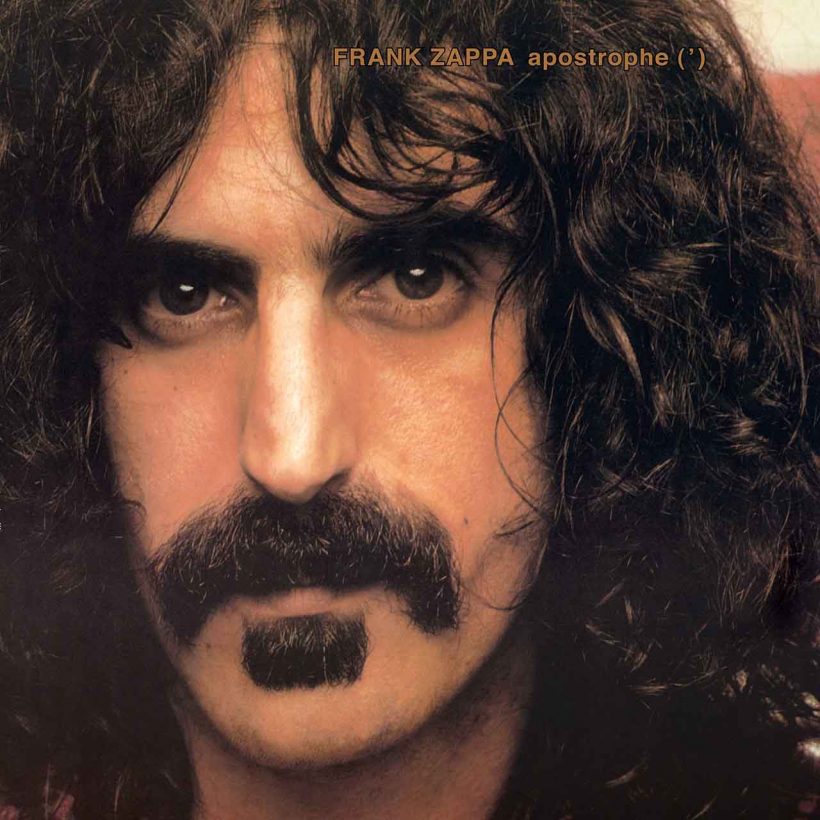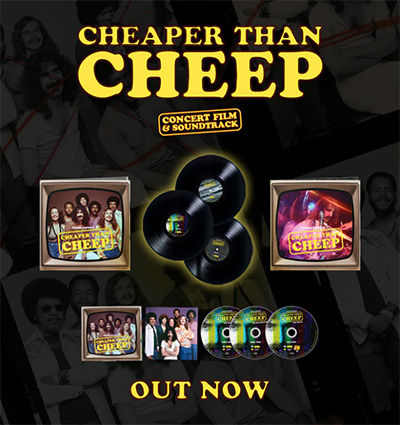‘Apostrophe (’)’: When Frank Zappa Was Embraced By The Mainstream
Zappa’s commercial breakthrough might have happened thanks to a novelty single, but the album delivered thrills galore for fans.

Frank Zappa’s 1974 album Apostrophe (‘) is one of the composer’s defining records. Firstly, there’s that sleeve image; half-hair and moustache, half Zappa looking intensely into the camera – this is how he is remembered by the public at large. It was also his biggest seller to date following the success of the single “Don’t Eat The Yellow Snow,” his first Top 100 hit in the US. But anyone who bought the album based on the single would have been surprised, Apostrophe (’) demonstrated Zappa’s dazzling musicality, his mastery of multiple genres, and his satirical edge.
Interviewed for the Classic Albums documentary that focuses on Apostrophe (’) and its immediate predecessor, Over-Nite Sensation, Frank’s son, Dweezil, suggested that the albums represent the ideal starting point for a Zappa beginner, “My first recommendation to anybody who hasn’t heard Frank’s music is to listen to Apostrophe (’) and Over-Nite Sensation because they have everything you could ever want, it’s the rock, jazz, funk, the attitude, and the humor, all at once.”
Listen to Frank Zappa’s Apostrophe (‘) now.
Zappa would later give credit for his commercial breakthrough to a Pittsburgh radio DJ, Dennis Waters. In a 1989 interview with Goldmine, Zappa explained that “Apostrophe (’)… was our first gold record. And that was an accident because a radio station in Pittsburgh took ‘Don’t Eat The Yellow Snow,’ cut it down from 10 minutes to three, which was part of a chain, part of their format of playing novelty records from the 60s. The guy who did it heard the song, perceived it as a modern-day novelty record, and put it on right alongside ‘Teeny Weeny Bikini,’ and it became a hit. And at this time, we were touring in Europe. We hadn’t even released it as a single, and I was informed in Europe that I had a hit single on this chain of stations in the East Coast what do you want to do about it? And I told the engineer, who was still in Los Angeles, who worked on the album, to edit a version of ‘Don’t Eat The Yellow Snow’ to match the way this guy had cut it, and put it out. And it was a hit. It was nothing that I could have foreseen… Who knew? The credit goes to the DJ.”
On Apostrophe (’) the “Don’t Eat The Yellow Snow” suite took up most of the entire first side of the album. The suite follows a dream Zappa apparently had about an Eskimo named Nanook embarking upon an odyssey featuring baby seals, lead-filled snowshoes, and a religious-themed pancake breakfast. But look past the attention-grabbing title and the zany lyrics, and it’s a cleverly constructed suite that highlights the complexity and wit of Zappa’s writing and the jaw-dropping talent of his band. In Classic Albums, Dweezil Zappa enthuses over the humorous musical call-and-response of the “Saint Alphonso’s Pancake Breakfast” section, “It’s almost cartoon-esque, the way he’ll create one phrase and sing about it in a voice and then answer it with this filigree with the musicians…. The personality and sense of humor brings it to life.”
In the same documentary, vibraphone player Ruth Underwood shows staggering skill as she plays “Rollo,” a piece that is a perfect example of music that showcases her dexterous playing, saying, “Many of the parts that Frank wrote for me just suited me perfectly. It’s the music that I would’ve written for myself if I had that talent. Frank knew how to do that for me. I think he knew how to do that for everybody.”
At the point of recording the suite, Zappa’s band were road-honed and rehearsed to within an inch of their lives, as keyboardist George Duke makes clear in the documentary, “We not only rehearsed for hours but recorded for hours… and that’s the kind of the way it worked, every day around the clock, and rehearsals were pretty much the same way… this was a commitment, this was not like you just join a band and say ‘see you next week guys, we’re going on tour.’ This was a serious commitment, a commitment to excellence.”
The second side of Apostrophe (’) was a grab-bag of tracks recorded over the previous few years with varying line-ups, yet it has a consistency that underlines the strength of Zappa’s musical personality. Tracks like “Cosmik Debris” and “Uncle Remus” also had a lyrical depth that offset the wackiness of the first side. Zappa was always a reluctant lyricist and keen to avoid cliché wherever possible. Speaking about “Cosmik Debris” – a savage put-down of peoples’ tendency to ally themselves with Eastern mysticism and gurus – in an interview around the release of Apostrophe (’) he said, “If I have to write lyrics because people like to hear the human voice attached to instruments, I’ll write about things that interest me and have an honest reflection of my point of view. So I’ll tell them the same way I feel. I think gurus [thumbs down] – bite it.”
An equally cutting lyric about more serious matters can be found on the soulful “Uncle Remus,” a co-write with George Duke that was first recorded during the 1972 sessions that gave us Waka/Jawaka and The Grand Wazoo. The lyric offered a sardonic look at the stalled progress of the civil rights movement. Interviewed by Andy Hollinden in 1997, Duke revealed, “’Uncle Remus’ came about as a result of Frank producing a demo for me… We did three songs, and ‘Uncle Remus’ was one of them… he said, “I think I’d like to use this track on my album, and I’m going to write some lyrics to it.’ And so I said, ‘Hey Frank, you paid for it. Go ahead.’… I would never have written a lyric like that. I really wouldn’t have, but Frank saw the humor in it. He just decided for some reason to put it on his record.’” That vision is, of course, what makes Zappa so special.
Apostrophe (’) may have seen Zappa being embraced by the mainstream like never before, but the composer was every bit as inventive, thought-provoking, and exciting as ever.














